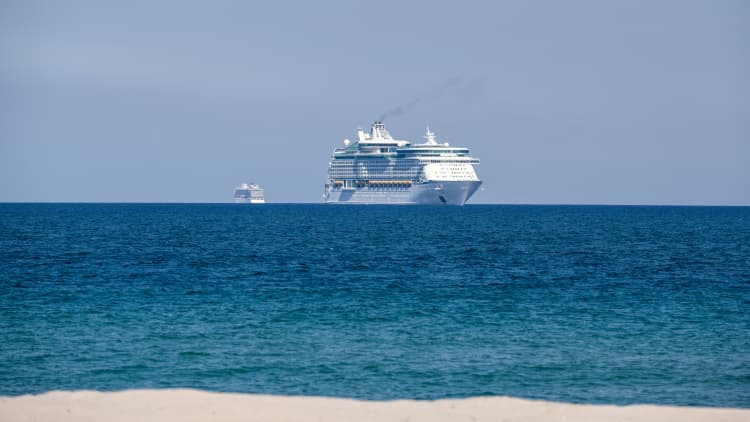The Centers for Disease Control and Prevention on Thursday extended its ban on passenger cruising from U.S. ports through Sept. 30, citing "ongoing" coronavirus outbreaks aboard ships.
The CDC's no-sail order was previously due to expire on July 24. The Cruise Line International Association, which represents the largest cruise lines in the world, announced last month that its members had agreed to suspend operations until Sept. 15.
Shares of Norwegian Cruise Line finished the day down more than 15%. Royal Caribbean stock dropped over 7% and shares of Carnival Corp. traded nearly 10% lower at the market close.
The coronavirus pandemic has rocked all three companies particularly hard as it's brought global travel to a trickle. All three companies have been operating with low or no revenue since mid-March, when the trade group said its members would suspend operations. Shares of Norwegian are now down more than 73% on the year while Royal has dropped over 59%. Shares of Carnival Corp., the largest cruise operator in the world, have tumbled over 68% since Jan. 1.
The CDC said it's been in touch with all three companies as well as the trade group and other cruise operators, including Disney, in assessing their plans to resume operations safely. The CDC said all proposals it initially received from cruise operators have been "incomplete" and "did not fully meet all the requirements" laid out in the health agency's April 15 no-sail extension order.
As of July 10, a cruise ship operator that owns one cruise ship in U.S. waters submitted a plan that met all of the CDC's criteria, Redfield said: Bahamas Paradise Cruise Line. The agency added that some operators have expressed intent to "temporarily withdraw all ships remaining in U.S. waters."
As of April 29, the CDC had received plans from seven cruise companies, representing 110 ships, the agency said. But as of July 10, operators had reduced the number of ships they proposed to operate in U.S. waters to 49, the CDC said, "with some operators choosing to temporarily withdraw all ships remaining in U.S. waters."
The agency specifically said that Carnival Corp. informed the CDC on May 24 and again on June 3 that it does not expect to have any of its ships in U.S. waters until the expiration of the no-sail order. Therefore, the CDC said it is halting its review of Carnival's proposal to resume sailing in the U.S.
The CDC added that it remains concerned about a number of elements of the companies' return-to-sailing plans, including failing to close self-serve buffets, gyms and salons.
In extending the ban on Thursday, CDC Director Dr. Robert Redfield said that data collected by the agency shows at least 2,973 Covid-19 infections or Covid-like illnesses as well as 34 deaths came from cruise ships since the CDC started tracking the data earlier this year.
"These data have also revealed a total of 99 outbreaks on 123 different cruise ships, meaning that 80% of ships within U.S. jurisdiction were affected by COVID-19 during this time frame," Redfield wrote in the letter. "In addition, 9 ships still have ongoing or resolving COVID-19 outbreaks on board."
Redfield wrote that current scientific evidence suggests that cruise ships present a greater risk of transmitting Covid-19 than other settings. He cited a study published in the Journal of Travel Medicine that said the basic reproduction rate, a number epidemiologists use to calculate the number of new cases expected from each infected person, was 14.8 aboard the Diamond Princess, one of the first cruise ships to experience an onboard outbreak.
That means that every infected person aboard the Diamond Princess was estimated to pass it on to nearly 15 other people, on average.
"This reproduction rate is approximately four times higher than the R0 of the original epicenter of the outbreak in Wuhan, China...," Redfield wrote. "Cruise ship conditions amplified an already highly transmissible disease."

The CDC said "several instances of potential non-compliance" with the no-sail order has made it more difficult for cruise companies to submit appropriate plans to safely resume sailing. Redfield said the agency wrote a letter to cruise companies on May 11 saying that the agency is aware of allegations of non-compliance. The CDC said only the trade group and two companies responded in writing to the letter: Royal Caribbean and Virgin Voyages.
The agency then wrote individual letters addressing allegations of non-compliance to Norwegian Cruise Line and Disney Cruise Line, the agency wrote. The CDC noted that a number of companies have taken "tentative steps to advance their public health response."
The agency specifically called out Royal Caribbean's and Norwegian Cruise Line's joint "Healthy to Sail Alliance," which is co-chaired by former Food and Drug Administration Commissioner Dr. Scott Gottlieb and former Utah Gov. Mike Leavitt, who served as secretary of Health and Human Services under former President George W. Bush. Other members of the panel include infectious disease specialist Dr. Michael Osterholm and former CDC Director Dr. Julie Gerberding.
"We have been in contact with the CDC. The panel has been in contact with the CDC," Royal Caribbean CEO Richard Fain told CNBC's Seema Mody in an interview last week on "Squawk on the Street." "They're well aware of it and they have reacted warmly to it, so I'm actually quite positive that we're doing exactly what we should do."
"And as soon as we can provide definitive proof that it is safe to go on a cruise, and that's what the panel's mission is, they'll be back," Norwegian CEO Frank Del Rio said last week.




